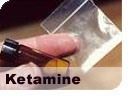LSD | Rohypnol | GHB | Ketamine | Steroids | Tobacco | Alcohol
KETAMINE

Ketamine is an anesthetic that is abused for its hallucinogenic properties. Its predominant legitimate use is as a veterinary anesthetic; however, it has been approved for use with both animals and humans. Abuse of the drug gained popularity when users discovered that it produced effects similar to those associated with PCP. Because of its anesthetic properties, ketamine also reportedly has been used by sexual predators to incapacitate their intended victims.
What does Ketamine look like?
Ketamine generally is sold as either a colorless, odorless liquid or as a white or off-white powder.
Powdered Ketamine.
In either its powder or liquid forms, ketamine is mixed with beverages or added to smokable materials such as marijuana or tobacco. As a powder the drug is snorted or pressed into tablets— often in combination with other drugs such as 3,4-methylenedioxymetham-phetamine (MDMA, also known as ecstasy). As a liquid, ketamine is injected; it often is injected intramuscularly.
Who abuses Ketamine?
Teenagers and young adults represent the majority of ketamine users. According to the Drug Abuse Warning Network, individuals aged 12 to 25 accounted for 74 percent of the ketamine emergency department mentions in the United States in 2000.
Ketamine use among high school students is a particular concern. Nearly 3 percent of high school seniors in the United States used the drug at least once in the past year, according to the University of Michigan's Monitoring the Future Survey.
What are the risks?
Ketamine causes users to have distorted perceptions of sight and sound and to feel disconnected and out of control. Use of the drug can impair an individual's senses, judgment, and coordination for up to 24 hours after the drug is taken even though the drug's hallucinogenic effects usually last for only 45 to 90 minutes.
Use of ketamine has been associated with serious problems—both mental and physical. Ketamine can cause depression, delirium, amnesia, impaired motor function, high blood pressure, and potentially fatal respiratory problems.
In addition to the risks associated with ketamine itself, individuals who use the drug may put themselves at risk of sexual assault. Sexual predators reportedly have used ketamine to incapacitate their intended victims— either by lacing unsuspecting victim's drinks with the drug or by offering ketamine to victims who consume the drug without understanding the effects it will produce.
What is Ketamine called?
The most common names for ketamine are K, special K, cat valium, and vitamin K.
Is Ketamine illegal?
Yes, it is illegal to abuse ketamine. Ketamine is a controlled substance. Specifically, it is a Schedule III substance under the Controlled Substances Act. Schedule III drugs, which include codeine and anabolic steroids, have less potential for abuse than Schedule I (heroin) or Schedule II (cocaine) drugs. However, abuse of Schedule III substances may lead to physical or psychological dependence on the drug.







